Samudayik Awaaz: Voices of Nepal, an evidence-based advocacy campaign
In 2021, Simavi launched a participatory radio-campaign in Nepal to amplify the voices of the local community.
The campaign engaged more than 10 thousand Nepalese, who shared the challenges they face when it comes to WASH (water, sanitation and hygiene), Covid-19 and menstrual hygiene. Furthermore, the discussions among decision makers and community representatives served as a public forum for evidence-based lobby and advocacy to hold duty bearers accountable and aware of the challenges in water and sanitation.
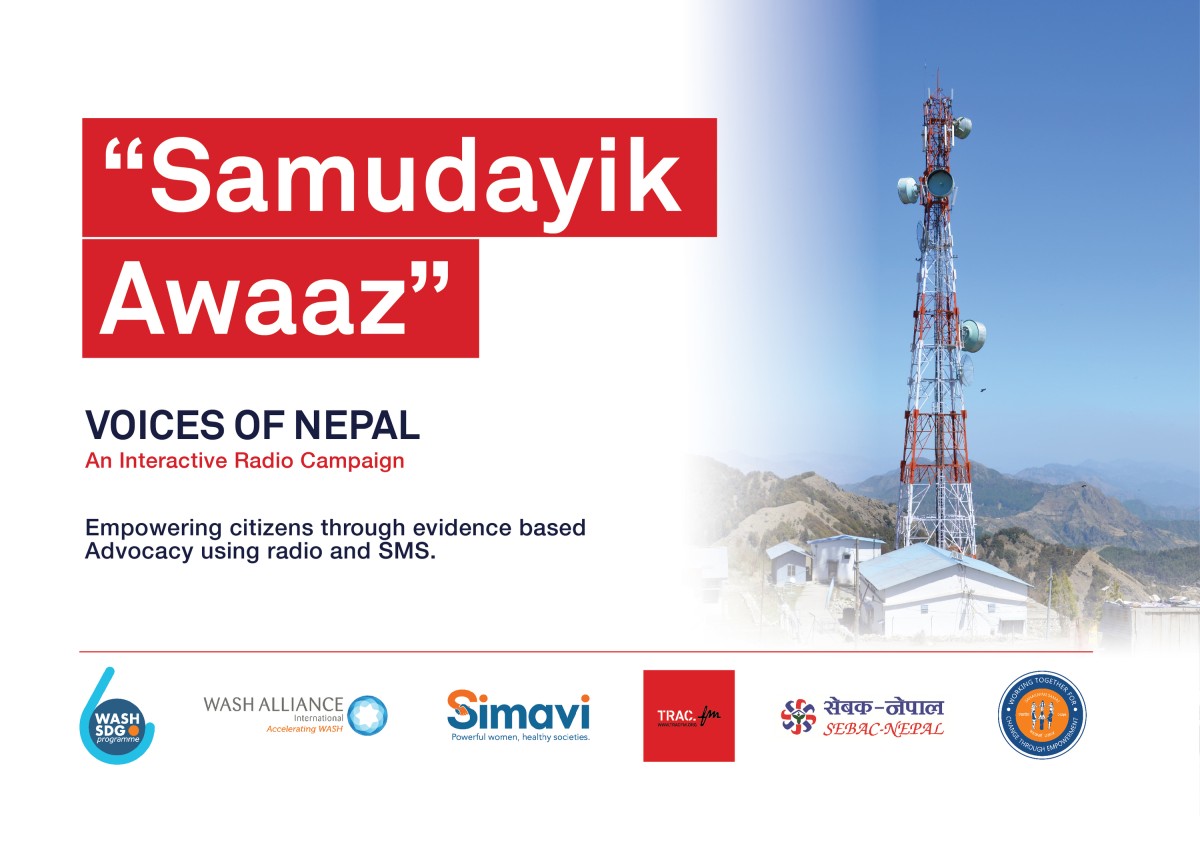
Holding duty bearers accountable and aware of the challenges in water and sanitation
Running a radio campaign was a good way to reach a large audience in a Covid-19 world where community gatherings and public forums were limited. Radio is a widely used channel for mass communication and awareness in Nepal, where many people still live in rural parts of the country.
Concept of the radio show
The radio campaign ran between June 2021 and October 2021, allowing its listeners to have their voices heard by casting their vote on six poll questions through a toll-free number. Each poll question was broadcasted through four radio stations for 2 weeks each. The results of the poll were then analyzed and discussed during a 1-hour live radio talk show, where experts on the topic and decision makers at the local government level were invited. Using radio as a medium of communication made information accessible for a large audience.
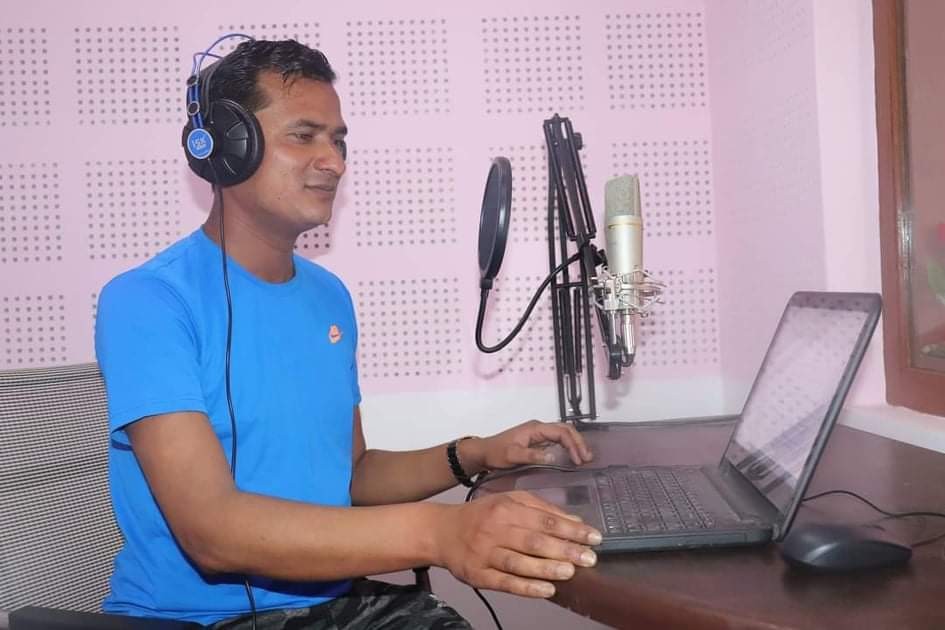
Engagement beyond expectation
The level of engagement went beyond expectation as more than 10 thousand people actively engaged by sending text messages in response to our poll questions. The results of the incoming SMS could be tracked live on the TRAC FM website. And the incoming messages could be traced to the two programme locations: Sindhupalchowk for ASHA programme and Banke for WASH SDG programme.
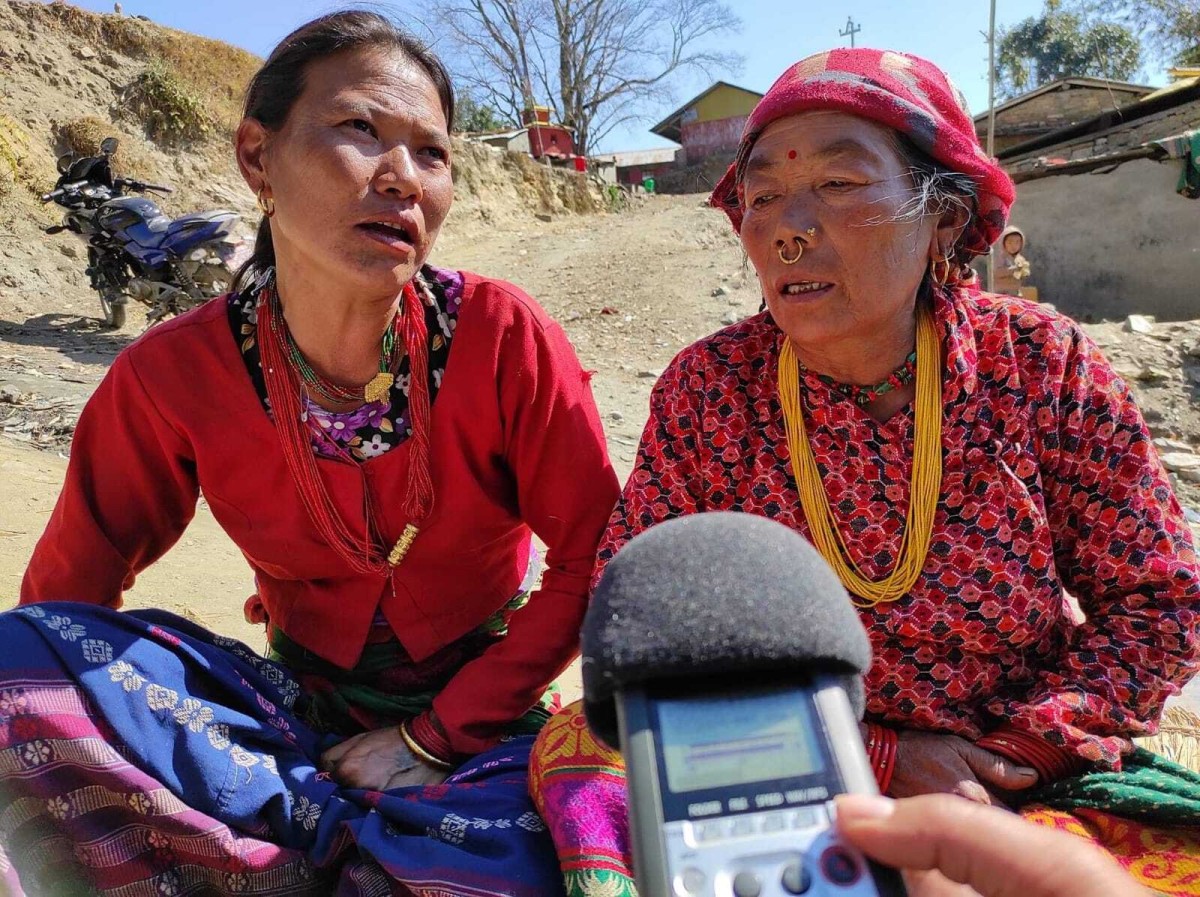
Most pressing issue: Covid-19
The campaign started when Nepal was still under lockdown restrictions due to rising cases of Covid-19. Therefore, it kicked off by addressing the most pressing issue at that moment and asked: 'What impact is Covid-19 having on your life?'.
In Sindhupalchowk, 39% of the respondents said that they were experiencing stress and fear of getting Covid-19 and 31% were finding it difficult to acquire even the most basic needs. In Banke, 29% responded they were experiencing stress and fear due to Covid-19 while 30% were finding it difficult to acquire their basic needs. The financial impact of Covid-19 was found to be more severe in Banke (33%) than Sindhupalchowk (16%) due to a higher dependence on income from cross-border employment in India.
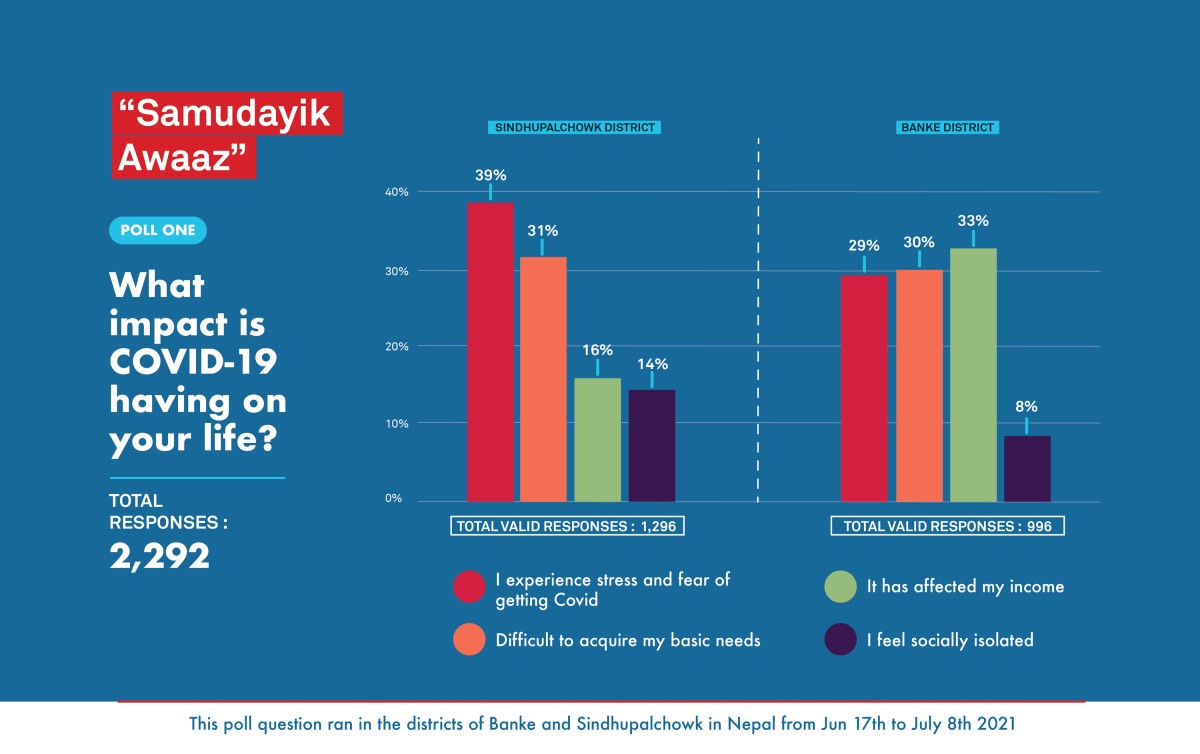
'Three months back, I tested positive for covid-19. The symptoms were mild, and I got better soon after. Can I catch the virus again? I am worried that if I get it again, it will be more severe this time. Is it true that the second time is worse?'
Getting insights into the challenges around Water Sanitation and Hygiene (WASH)
Both programmes ASHA and WASH SDG are built around the objective of achieving the targets of SDG 6 Clean Water and Sanitation: Ensuring availability and sustainable management of water and sanitation for all. That’s why it was important to identify what the community perceived as the biggest barrier to accessing safe water. The radio poll asked, 'What is your biggest challenge when getting water for domestic use?'.
Over 1700 listeners replied to this poll – 57% of the respondents in Banke and 42% of the respondents in Sindhupalchowk said their biggest challenge is that water is not clean or safe to drink.
While basic water supply coverage in Nepal stands at 91 percent as of 2019/20, only 25 percent of the population have access to safe drinking water (National Planning Commission Nepal, 2020).
Water contamination is one of the most common problems in both Banke and Sindhupalchowk - leading to unsafe drinking conditions. The presence of microbes like E. coli that cause water-borne diseases such as diarrhea is a common cause of contamination.
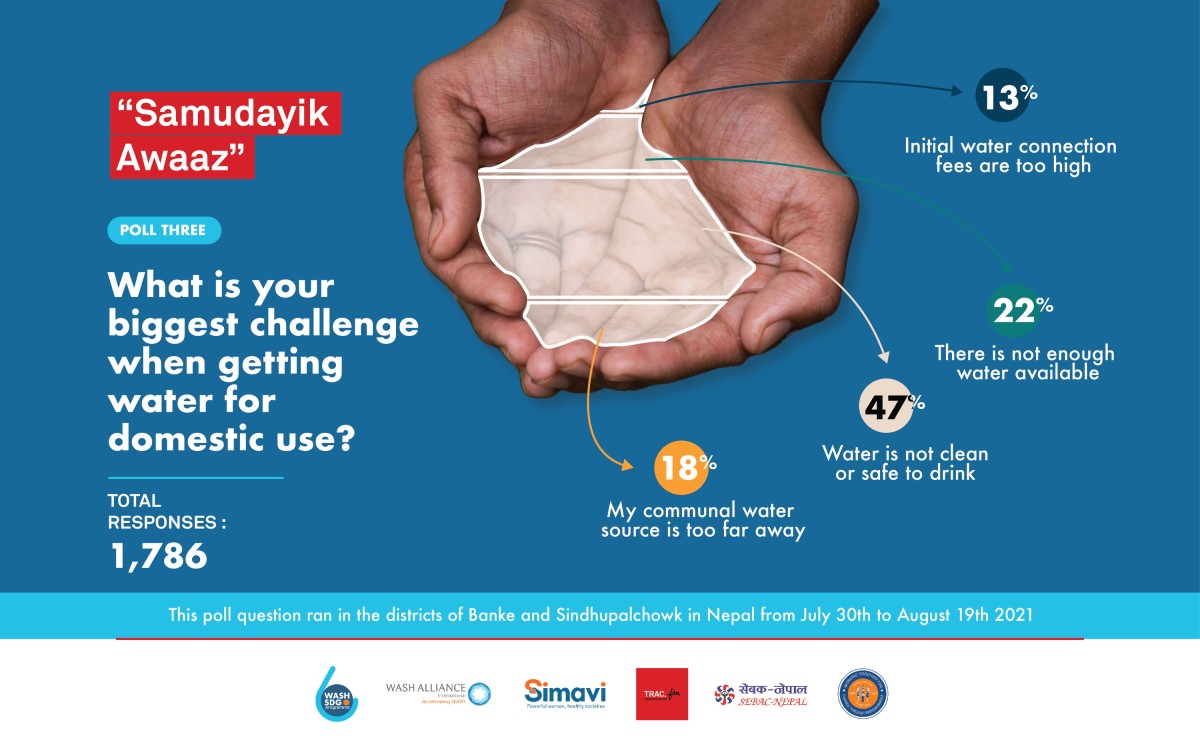
The biggest concerns when it comes to toilets and hand hygiene
Access to improved sanitation also remains low throughout Nepal. 10.8 million people in Nepal still do not have access to improved sanitation (UNICEF). To get a broad understanding of what community members in our programme areas consider as their biggest challenge with sanitation, we aired a radio poll asking them what their biggest concern was within their household when it comes to toilets: here the poll results indicate that more than 40% of the respondents in both Banke and Sindhupalchowk see the lack of handwashing stations nearby as their biggest challenge.
Handwashing is recognized as a top hygiene priority under the Sustainable Development Goal 6 (indicator 6.2). To increase the availability and practice of handwashing, not only physical infrastructure but also behavioral change interventions will need to be promoted. Following this, the next biggest challenge for our communities was the toilet getting clogged frequently (27%) and the lack of sufficient water to clean the toilet (26%).
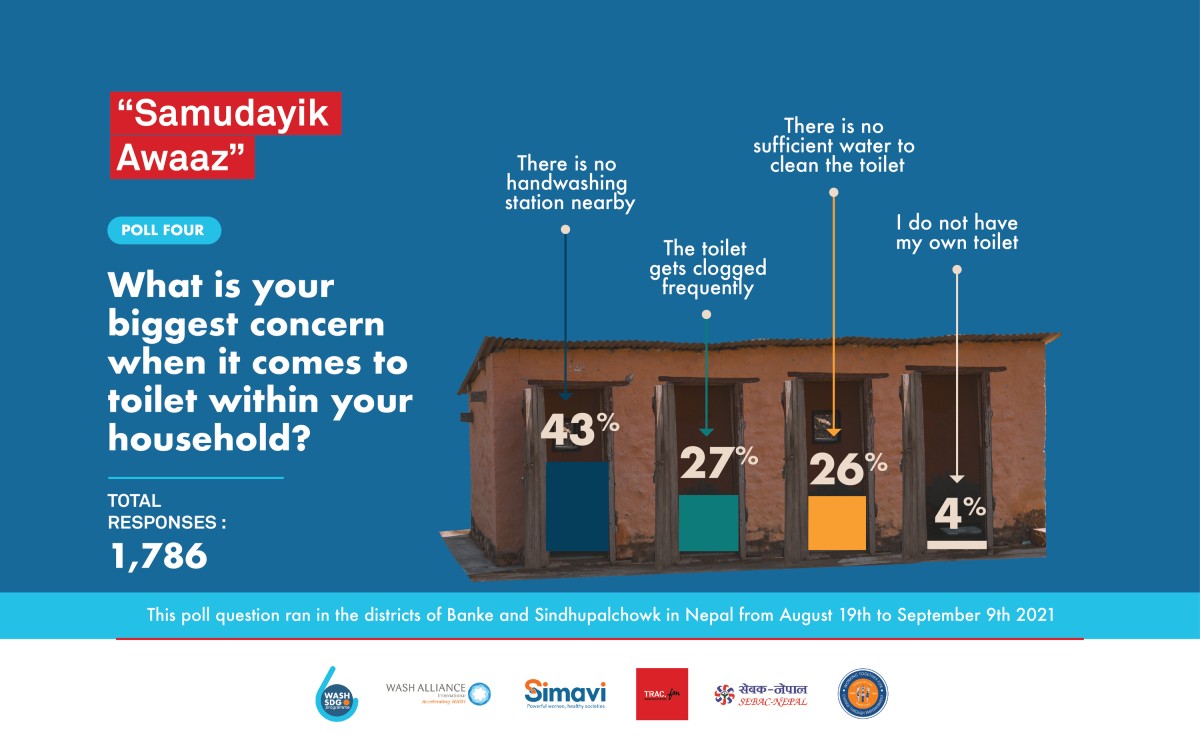
Menstrual Health: what are the challenges and, who should teach about it?
In Nepal, many still see menstruation as a girls’ or women’s issue and boys and men are often excluded from the conversation around it. But it is a human rights issue because menstruation is linked to restrictions on access to water, sanitation, food and shelter.
That why we asked: 'What is the biggest challenge in improving menstrual health?. More than 1600 respondents replied to this radio poll, where many of the respondents said the biggest barrier to improving menstrual health is the stigma around openly talking it. Menstruation is still a topic of taboo in Nepal. The poll results show that both men and women are uncomfortable to talk openly about it. This has resulted in many misconceptions, superstitions and lack of factual, scientifically based information that has been shared between generations. In addition to this, the lack of menstrual friendly WASH facilities with no disposal bins or running water is also a challenge faced by women in Banke and Sindhupalchowk.
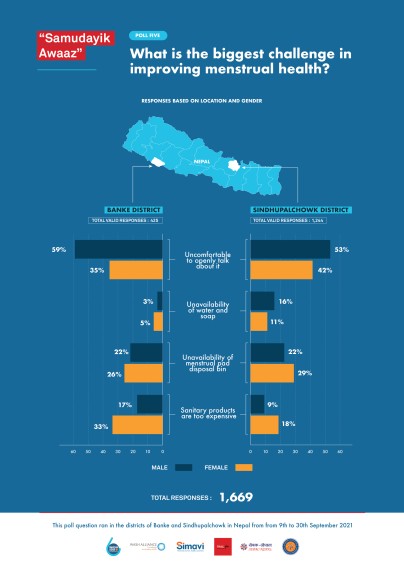
'When I got my first period, I was scared. I didn’t know what was happening and if it was only me, or did others experience it too. I remember sleeping in our neighbors house as I was not allowed to sleep in my house.'
Is it a mother's duty?
To go deeper into the subject of menstrual health, we did a poll with a follow up question being: 'Who should teach about menstruation?'. Close to 1000 people responded and it’s interesting to see that the results were different in Banke compared to those in Sindhupalchowk. Majority of the respondents in Banke (61%) said that it should be the mother's duty to teach their daughters where in Sindhupalchowk, majority (41.4%) said that it should be the parent's responsibility to teach their children about menstruation.
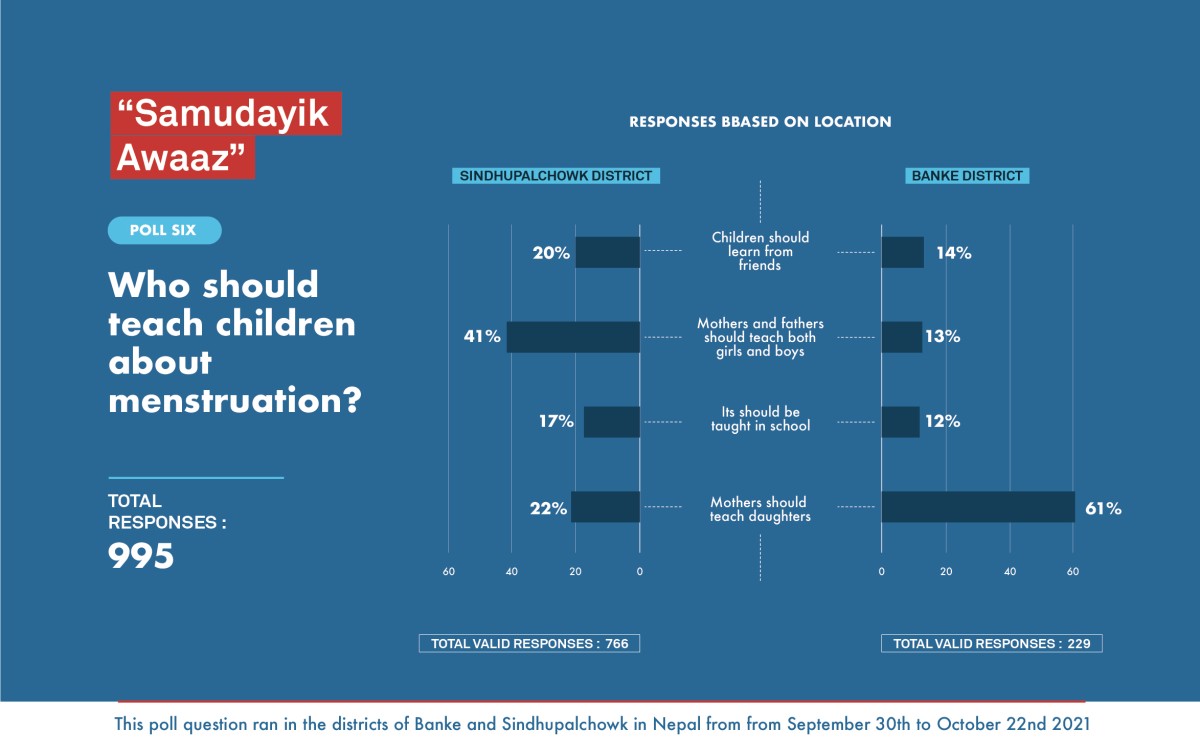
Joint Collaboration Partners
Samudayik Awaaz was a joint campaign between the two programmes of Simavi WASH SDG and ASHA. The design of this evidence-based radio campaign, with direct involvement of the public, increased the decision makers' attention towards water and sanitation issues. In addition, the results of the poll have also guided Simavi and her partners in defining lobby and advocacy agendas within the programmes.
Under the ASHA programme, the campaign ran in Sindhupalchowk district coordinated by our local partner SEBAC – Nepal. Under the WASH SDG programme, the campaign ran in Banke district, coordinated by our local partner Sahakarmi Samaj. Our local radio station partners were Radio Sindhu, Radio Melamchi, Pratibodh FM and Bheri FM. The overall campaign was coordinated by Simavi and Trac FM who also supported us with technical set up.
Are you curious to get full insights into the campaign? Read the final campaign report.
Infographics by Trac FM


